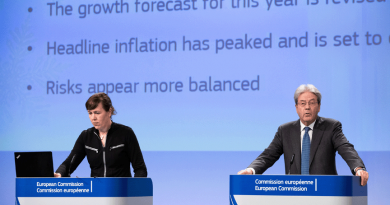Enabling digital trade
World Commerce Review interview Dr Graham Bright, a leading thinker on the digitalisation of trade, about the challenges that need solving

Tell us about Euro Exim Bank?
Founded in 2017, the bank is headquartered in St. Lucia, West Indies, regulated, supervised and authorised by the Financial Services Regulatory Authority. EEB also have a representative office in London. From humble beginnings with a core team of 10, now, with a network of sales agents and partners in 190+ countries, we serve import and export businesses. EEB are one of the fastest growing and widest reach trade institutions anywhere across the globe.
EEB provides financial services to facilitate international trade, through issuance of key instruments for both buyers wishing to arrange imports, sellers to guarantee payment, and contractors wishing to bid for major infrastructure projects. Our clients are registered corporates based in active markets such as Asia, India, Middle East and Africa.
What is the main advantage of partnering with Euro Exim Bank?
In our extremely dynamic business sector, demand for new products and critical raw materials has changed the way that companies and countries are looking at new supply chains.
From previously untapped markets, hit by lack of trust, low liquidity, expensive and compromised supply of fiat currency, withdrawal of major bank services and fragile infrastructure, the need is greater than ever for a specialist trade finance bank. Recognising our economic rates, fast issuance and local contacts in both developed markets and disintermediated emerging jurisdictions, EEB is a natural partner.
With free trade agreement opportunities and new partnerships, com0munity events, and a growing network of agents and partners, EEB are ideally positioned to support and serve the ever-growing volumes of world trade.
What key services can EEB provide to the customer?
In addition to the issuance of stands trade instruments such as letters of credit and standby letters of credit, along with performance bonds and bank guarantees, the bank can also provide bank comfort letters, proof of funds and advanced guarantees.
In addition, the bank is providing services to corporate clients wishing to boost their balance sheets through bond issuance. Here we work in identifying companies looking to raise capital on USD markets by working on initial feasibility studies and introducing them to fund providers.
What sectors and geographical areas does Euro Exim Bank cover?
Our sales network now covers over 190 countries, and this gives us a unique global perspective which keeping contacts local.
Our clients deal in all manner of goods, from food to machinery, batteries to garments, and we have had dealings with clients on six continents.
Most business comes from Asia, Africa and India, and we are seeing more interest for critical raw materials, from Africa and South America fuelled by international free trade agreements and insatiable worldwide demand for metals.
Globalisation is inevitable. The world is becoming increasingly connected, driving the need for faster and more efficient crossborder payments
What digital technologies does Euro Exim Bank employ?
As members of the ICC and as an active participant in the UK APPG All Party Parliamentary Group on trade, EEB are very aware of new technologies that will improve speed, accuracy and connectivity, in a long-awaited move from bureaucratic paper (mainly unchanged since the 1800s) to digital processes.
Specifically in the UK, The Electronic Trade Documents Act is a ground-breaking piece of law facilitating removal of legal barriers to digitalising commercial trade documents where information can flow more easily between the public and private sectors and across jurisdictions with trading partners. Our IT teams are purposefully embedding the recommendations and practical solutions offered by this legislation.
Our home-built trade platform also incorporates machine learning and blockchain capabilities, both of which technologies have improved internal processes, however, with all use of commercial blockchains is yet to see true benefits to end users, especially in geographically challenging countries.
Other technologies used include the transmission of standardised authenticated financial messaging via SWIFT, where we relay our instruments to banks securely for safe and verified delivery to ultimate beneficiary banks.
What plans for the future does Euro Exim Bank envisage?
Within 5 years, to be the largest, fastest growing, most trusted, truly global, reliable and innovative trade finance institution on the planet where our culture is driven by an obsession with excellence, integrity and an entrepreneurial spirit that recognizes and rewards vision and hard work.
Through partnerships, acquisition, and with a focus on adding value for our customers and making the necessary investments, we hope to ensure long-term success.
By offering services simply, efficiently and effectively, we will take advantage of opportunities in technology, ESG and supply chain dynamics to further establish ourselves as a global leader in the financial services industry, sustaining and accelerating our growth.
How do you see the future for crossborder payments?
This market is huge with C2C payments worth US$800 billion in 2022, and B2B crossborder payments set to exceed US$150Trillion by 2026. Banks have been the traditional de-facto providers of such services, managing international payments, which are essential to support the free flow of goods and services.
But change is coming, through emergence of fintech players looking to challenge the status quo. Their USP’s? Faster, more efficient, cheaper, less error prone services, cloud based, secured and ready now.
Real-time payments systems make it possible to send and receive cross-border payments instantly, where formerly, the problem was the time it takes to reach the recipient and complete a transaction.
By reducing the number of intermediaries and not being hampered by operating schedules and time zones, or even currency exchange, real-time payments are the way forward.
Central Bank Digital Currencies (CBDCs), digital versions of fiat currencies, will increasingly be used for real-time settlements between central banks. Whilst take up has been slow, more countries are showing interest and working on pilots. Once these proofs of concept filters down to domestic banks, and accepted by local companies, we may see a situation of ‘currency flight’, a lessening dependency on the US Dollar as the primary currency of trade.
Technologies such as blockchains can provide a secure and transparent way to transfer money with efficiency and compliance, as all transactions are immutably and securely recorded on a distributed ledger, allowing instant secure transfer between two parties, even disintermediating banks.
Globalisation is inevitable. The world is becoming increasingly connected, driving the need for faster and more efficient cross-border payments.
We are already seeing a proliferation of alternative finance providers, fintech driven payment start-ups and interest from tech giants wanting to extend their market share as traders to full blown banking services supported by invoicing, identity and cross-border data management.
As these companies are not encumbered by the constraints of ever-changing financial regulations as applicable to traditional banks, they are uniquely positioned to rapidly innovate, offer new cost-effective solutions and ultimately take market share.
How will fintech enhance global trade?
The opportunities and economies of fintech in trade are significant.
Firstly, automating the process across the entire instrument lifecycle encompassing the full ecosystem, still consisting of siloed operations and disparate participants. Then, the accuracy and clarity of data, with early verification, identifying risk, enabling risk mitigation and lower contingent liability.
Also, connectivity, with easier communication and provision of new online banking services, for example, embracing digital and crypto currencies to reduce fx requirements, with real time transfer.
The latest iteration of fintech driven trade will be assisted through peer-to-peer (P2P) lending networks giving access to competitive funding for all sizes of companies.
This innovative mechanism may help smaller companies remove trade barriers, increase liquidity, and reduce administrative burden where they have traditionally been disadvantaged through small deal size, expensive FX and bureaucratic process.
Whilst trade remains vital to global economies, there are still deep-rooted challenges to be solved.
By employing technologies such as blockchain, real-time cross and digital currency payments through P2P networks and alternative funding options from non-regulated financial institutions, the trade landscape is undergoing rapid change.
Nirvana for trade is inclusivity, collaboration, affordability, security, digitisation, settlement finality and transparency, enabling all players regardless of geography, currency, culture, and tariffs to compete on the global stage effectively and economically, without being disadvantaged financially, exploited and bypassed. Fintech can only assist in this lofty ambition.



